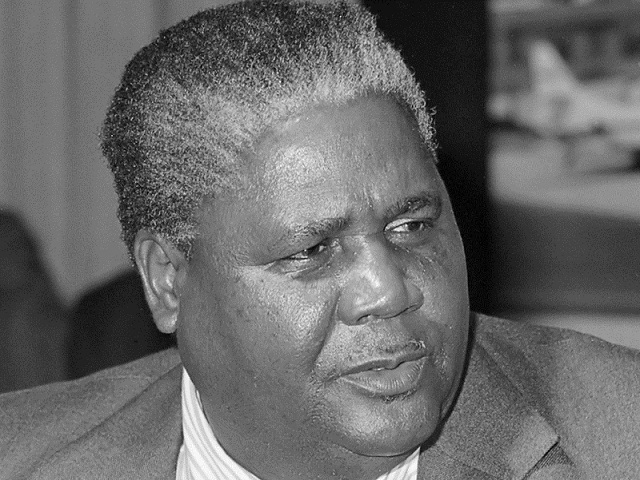
The Sunday News

Saul Ndlovu
The nation marked the 19th anniversary of the death of Father Zimbabwe, Joshua Mqabuko Nkomo last Sunday. Veteran journalist and war veteran Saul Gwakuba Ndlovu presented a paper on the late Vice-President in Harare last week.
Following is the presentation.
Dr Joshua Nkomo’s life became a part of the political historical development of Southern Rhodesia, now Zimbabwe, in practical terms from 1951 when he was invited by the then prime minister of the country, Sir Godfrey Huggins, to be a member of a delegation that went to London to discuss whether or not Southern Rhodesia should be a part of a proposed Federation whose other components were to be Nyasaland and Northern Rhodesia.
At that time, he was employed by Rhodesia Railways as a social welfare officer and was based in Bulawayo.
Many narrations have been presented about his early life from his birth in the Matobo District of Zimbabwe’s Matabeleland South Province up to the time he studied in South Africa. It is not necessary to repeat that narration in this brief presentation.
We must state however, that Nkomo’s passion to free the black people of his country from a colonial system that ruthlessly displaced them from their traditional places of abode, arbitrarily dispossessed them of their livestock, mercilessly exploited them and their natural resources and inhumanly discriminated against them on the basis of their skin colour, was formed by the removal of the Nkomo family and the whole community from one place to another to make room for white farmers brought from Europe by the Southern Rhodesia colonial regime.
Two factors strengthened that passion during his six-year-long stay as a student in South Africa. One was the brutal oppression and exploitation of the black people by the minority white settlers in that country, and the other was the resolute stand by the black population to liberate themselves through the African National Congress (ANC), an organisation formed in 1912, five years before Nkomo was born.
A branch of that liberation movement was launched in Southern Rhodesia in 1934, and to assist those behind that project was an educated black South African, Professor Jabavu.
Led by the Rev Thompson D. Samkange who was by then based in Bulawayo’s oldest African township, Makokoba, Joshua Nkomo joined the ANC of Southern Rhodesia’s leadership.
Nkomo’s commitment to the black people’s cause was soon recognised by the ANCSR president, the Rev. Samkange, who made him, in effect, his deputy. At his workplace, Joshua Nkomo had been elected secretary-general of the Rhodesia African Workers’ Union (RAWU).
As a leader, Joshua Nkomo recognised and promoted two important things: Unity among the people, and the need to initiate industrial projects among the people. Dr Nkomo believed that national unity would generate national peace, and that individual political power was, without any doubt, less important than national tranquility.
In 1983 at the beginning of the Entumbane disturbances between some Zanla and Zipra forces, he told the presenter of this paper in the presence of his friend, William Mpotshi Sivako: “If you young men thought that I, Joshua Nqabuko, fought for the liberation of this country so that I would personally rule it, you were mistaken. I fought so that this country gets into the hands of a black person; who that black person is, does not matter to me.”
He later signed the PF–Zapu/ Zanu (PF) Unity Accord and dissolved PF– Zapu, a decision that was prompted by his patriotism. It is of much historical interest to compare Robert Mugabe’s pre-independence statement in Mozambique that if he lost the election in 1980, he would return to the bush and continue the guerrilla war.
Whereas Joshua Nkomo’s liberation struggle was for everyone’s benefit, particularly economic prosperity, that for Mugabe was for personal political power. The most important national resource in Dr Joshua Nkomo’s opinion was land. He most strongly emphasised that land was the basis of accommodation and source of most of the natural resources and various foods nations consume. It was his well-considered opinion and conviction that residential areas should be on those places that cannot be used for agricultural purposes.
He strongly believed in national and international unity and co-operation. It was Dr Nkomo’s wish that an independent Zimbabwe should be multi-racial in composition, and non-racial in its social policies and practices.
Dr Nkomo’s economic development policy was based on, first, the village which must be made as self-reliant as possible, especially on such utilities as water, transport facilities primarily for local needs, medical and educational services; he wished every ward to create wealth and employment for its people first and foremost, and for the nation by and large.
To Dr Nkomo, agriculture, especially by means of irrigation, was the solution to Zimbabwe’s economic problems. It was his belief that Zimbabwe could certainly feed itself and have much surplus to export, particularly to some Middle Eastern countries from which it could import oil.
He was convinced that poverty alleviation could be achieved by promoting agriculture and establishing many downstream industries such as meat, fruit and vegetable canning enterprises, hides and skin tanning, leather products making, milk and its by-products such as cheese, butter, whey and whatever else that can be used as food for people and for pets.
Many of us still vividly remember Dr Joshua Nkomo’s famous dictum: “Nxa ufuna imali, phendulela ibala elithi lima, uthi ‘mali’ ubusulima.”
Dr Nkomo believed that the mining industry could benefit most of the people by the use of labour intensive instead of advanced technology mining methods. It was quite revealing that although he was not in control of the country, Dr Joshua Nkomo was instrumental in the establishment of some industrial and social projects in some parts of Zimbabwe a couple of years after independence.



